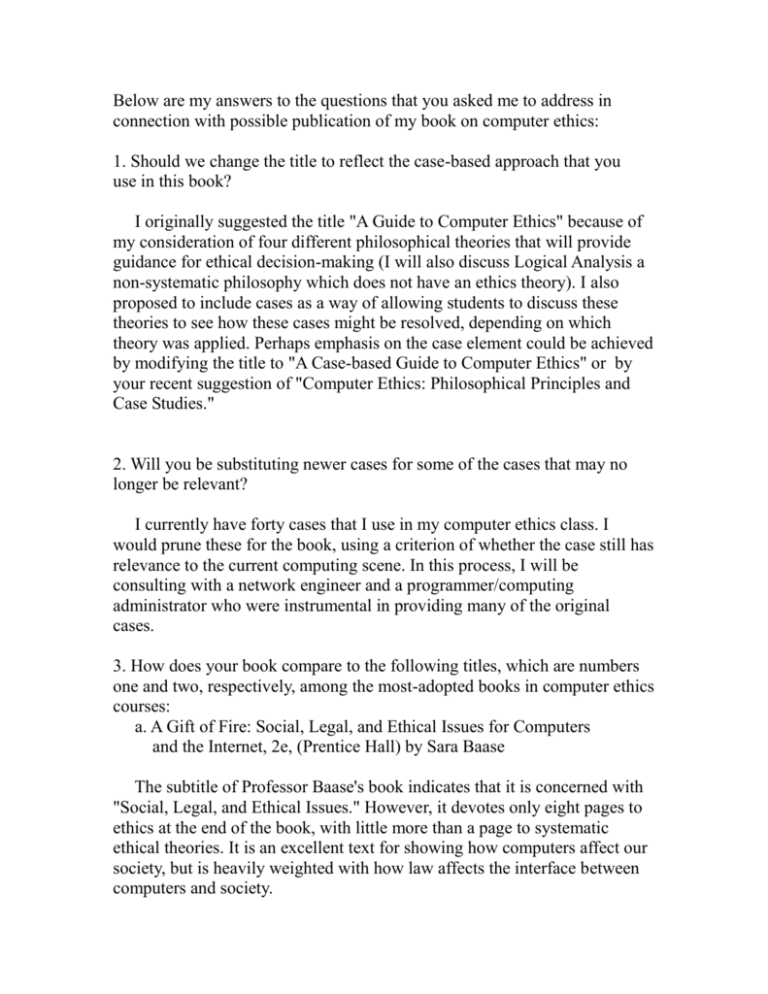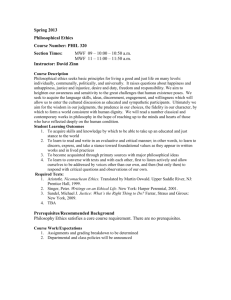
Below are my answers to the questions that you asked me to address in
connection with possible publication of my book on computer ethics:
1. Should we change the title to reflect the case-based approach that you
use in this book?
I originally suggested the title "A Guide to Computer Ethics" because of
my consideration of four different philosophical theories that will provide
guidance for ethical decision-making (I will also discuss Logical Analysis a
non-systematic philosophy which does not have an ethics theory). I also
proposed to include cases as a way of allowing students to discuss these
theories to see how these cases might be resolved, depending on which
theory was applied. Perhaps emphasis on the case element could be achieved
by modifying the title to "A Case-based Guide to Computer Ethics" or by
your recent suggestion of "Computer Ethics: Philosophical Principles and
Case Studies."
2. Will you be substituting newer cases for some of the cases that may no
longer be relevant?
I currently have forty cases that I use in my computer ethics class. I
would prune these for the book, using a criterion of whether the case still has
relevance to the current computing scene. In this process, I will be
consulting with a network engineer and a programmer/computing
administrator who were instrumental in providing many of the original
cases.
3. How does your book compare to the following titles, which are numbers
one and two, respectively, among the most-adopted books in computer ethics
courses:
a. A Gift of Fire: Social, Legal, and Ethical Issues for Computers
and the Internet, 2e, (Prentice Hall) by Sara Baase
The subtitle of Professor Baase's book indicates that it is concerned with
"Social, Legal, and Ethical Issues." However, it devotes only eight pages to
ethics at the end of the book, with little more than a page to systematic
ethical theories. It is an excellent text for showing how computers affect our
society, but is heavily weighted with how law affects the interface between
computers and society.
I do not favor giving major place to legal issues in a computer ethics
textbook. I often ask a specialist in Electronic Law from the Notre Dame
Law School to visit my course for one class period each semester. She has a
B.A. from Harvard, a J.D. from Yale, and has clerked for Sandra Day
O'Connor. She is a brilliant lawyer and an excellent teacher. But her
arguments are legally based rather than being philosophically based. Law is
very important and society could not survive without it. But, as I will show
early in my textbook, ethics and law are not the same thing. Computer ethics
cases should be analyzed on perduring ethical principles…even if there is
argument about which principles should enjoy priority. They should not be
analyzed primarily on precedents that change with time, shifting majorities,
and revisions of law.
In regard to use of cases, Baase's Chapter 4 has three "case studies," but
all of them conclude with the author's own views concerning a solution.
Students are not challenged to grapple with solutions to these cases.
I do not wish to denegrate Professor Baase's work, but on the basis of her
meager treatment of ethics and the inclusion of relatively few case-analyses,
I feel her book will not provide a high degree of competition to the book I
propose.
b. Ethics for the Information Age (Pearson Addison Wesley) by Michael
Quinn
My proposed book bears more similarity to Professor Quinn's book than
to Professor Baase's. Professor Quinn basically treats seven theories of
philosophical ethics, while I treat the four basic philosophical worldviews.
His treatment is not as systematic as mine. For example, although he
describes seven ethical theories, he does not connect them with the theories
of reality from which they flow. He also does not provide an instrument to
detect students' philosophical leanings, with interpretation of the results, as I
do. He does, however, reference philosophic theories when treating various
computing dilemmas later in the book. He also makes some use of
"scenarios," which are similar to my cases, but these are limited to eight
scenarios in Chapter 2 and three more in the Chapter 9 (where he
inexplicably introduces an eighth ethical theory). I feel Quinn's book will
provide the greatest competition to my proposed book, but I feel the
contents, approach, and unique features of my text will make it the better
choice.
Comparison with three other computer ethics texts:
c. Computer Ethics, 2e (Prentice-Hall) by Deborah G. Johnson
Now in its third edition, I used this book in my class when it was
originally published in 1985. Its philosophical theories are basically limited
to the two basic outlooks, relativism and absolutism. It is a bit verbose. I do
not feel it provides strong competition today.
d. Case Studies in Information and Computer Ethics (Prentice-Hall) by
Richard A. Spinello
Three basic ethical theories are developed. Many of the thirty-eight cases
the book contains are simply narratives of the events of the case, without
ethical analysis or questions for the student. Despite the focus on case
studies, I do not think this would be a competitive text.
e. Ethics and Computing: Living Responsibly in a Computerized World
(IEEE Press) by Kevin W. Boyer
Basically a compilation of reprints from other IEEE publications, this
book contains no significant treatment of ethical theories. It should not
provide competion to my proposed text.
4. You recommend that someone review some draft material about six
months before the manuscript is due. I would be agreeable to this
suggestion. If the book proposal were to be accepted at your meeting this
week, that would give me December, January, and February to write some
draft chapters to be submitted by March 1, and March through August to
prepare the manuscript for submission by September 1.
5. I would be happy to supply additional cases for a website related
to the book.
Here are my responses to questions from Reviewer B which were not
answered above:
Question 3: Have existing materials been used by students? Yes, they are the
result of teaching a computer ethics class for more than twenty years.
Question 4: How novel is the diagnostic inventory? Has it been validated?
Professor Colvin Ross first published an eighty item philosophical inventory.
After conferring with him, I tested the items over time with students and was
able to reduce the items to forty. I have continued to validate these items
periodically.
Question 5: Does the included worksheet actually facilitate one's ability to
make the most ethical decision? Or does it simply encourage people to better
document their own instinctive positions? The answer is difficult to prove,
but I believe it is the former rather than the latter. In either case, the
worksheet is a worthwhile exercise.
Question 6: What is the relevance of Chapter 2 and 8 to the question of
ethics? Chapter 2, The Computer as a Humanizing Agent, shows the
humanistic aspect of computing. Since ethics is concerned with human
decision-making, the humanistic side of computing is an important
consideration in the book. Chapter 8 concerns computing as a profession.
The traditional professions give special consideration to the ethical problems
that they may encounter and I believe that it is also appropriate for
computing to do so. I note that Quinn has a chapter on professional ethics in
his book.
Question 7: Is Kohlberg's view of moral development the only or the best
position on this matter? Does including a psychological perspective make
this book unique? My colleagues in Psychology tell me that Kohlberg is
indeed the leading figure in moral development research. I find it interesting
that a summary I did on Kohlberg's stages of moral development in 2000
gets more requests for inclusion in other works than anything else I have
ever written (see http://www.nd.edu/~rbarger/kohlberg.html). Many
philosophers feel that they have a "corner" on moral questions. While I feel
philosophy is fundamental to morality, I believe in a multidisciplinary
approach. I do believe my proposed book is unique in including examination
of what Psychology has to say about morality in computing matters, as well
as what Philosophy has to say about it.
In conclusion, I would say that the fundamental purpose of my book is to
show that "computer ethics" is not an oxymoron. The book will be unique in
its emphasis on a systematic view of philosophical ethics, the provision of an
instrument to assess students' leanings toward the four basic philosophical
theories, and will employ a humanistic, multidisciplinary, case based
approach.









